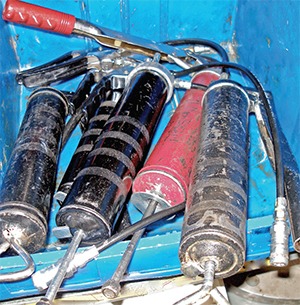Lubrication Strategies: Online Lube Training — Caveat Emptor
Ken Bannister | July 8, 2015
When it comes to lubrication best practices, information gleaned from online forums and posted videos could cost your operations.
“Free” extracts a price. Loyalty programs that provide point-based gifts track our spending habits and sell the data to other retailers. “Free” smart apps, offered in a restricted format, often try to up-sell users into fuller subscribed versions and/or inundate them with paid-advertising messages. These types of marketing strategies aren’t new. They’re high-tech versions of an old approach from the no-tech world, wherein savvy North American drinking establishments offered a “Free Lunch” to customers.
In the 19th century, patrons had to pay for a premium drink before they could eat at a bar’s free-lunch table, laden with salty foods that were cleverly crafted to make a person increasingly thirsty and, thus, eager to buy additional drinks. This practice led to the saying “there’s no such thing as a free lunch.” It’s a concept that has implications for today’s lubrication workforce.

This collection of grease guns, all with the same grease but with different displacements and gun pressures, presents a problem of inconsistency when a work order calls for x number of shots. These guns are also dirty, leading to contaminant introduction into machinery. They should be stored individually in an upright position in a grease-caddy holster. Photo courtesy EngTech Industries.
Seeking best practices
Watching several maintainers incorrectly use their handheld grease guns recently, I inquired about the training they had received. To a man, they referenced having been directed to a popular source of online videos to watch as many greasing demonstrations as they could find and then to emulate them.
Visiting the referenced website for myself, I discovered dozens of such videos and links to social-media forums doling out free advice on how to, among other things, refill grease guns and lubricate bearings. While elements of each video or bits of proffered advice could be construed as useful to viewers (or trainees), many of the shared practices could cause harm to a bearing or the person using the grease gun. Highlights included:
• Using a rusty, 50-yr.-old grease gun that transferred rust into a new grease tube.
• Cross-contaminating grease by replenishing an empty delivery tube with a totally different type of product, without cleaning the gun thoroughly or purging all old grease from the tube.
• Using an open-flame torch to liquefy and free old hardened grease, with no nod to safety equipment or safe practices.
• Incorrectly disassembling a grease gun to replace the delivery tube, creating a greasy mess and introducing unwanted air into the pump.
• Spinning a bearing dry and handling it with bare hands during a grease-packing procedure.
• Dropping a new bearing into metal shavings on the floor, then cleaning it “as good as new” with compressed air before greasing and installing.
• Filling a bearing with so much grease that the seal popped off.
Beware: Like the free lunch in yesteryear’s drinking establishments, the quality of the “food” in some free online lubrication training seems to be designed for and delivered to the untrained by the untrained.
Consider the source
By all means, enjoy as many online lubrication-related forums and videos as you wish. But make sure you and others on your lubrication team receive formal training from a reputable lubrication expert or qualified training organization. That’s the best way to identify and avoid the stupid—potentially costly—grease tricks that show up in free web content. Remember, you get what you pay for.









View Comments